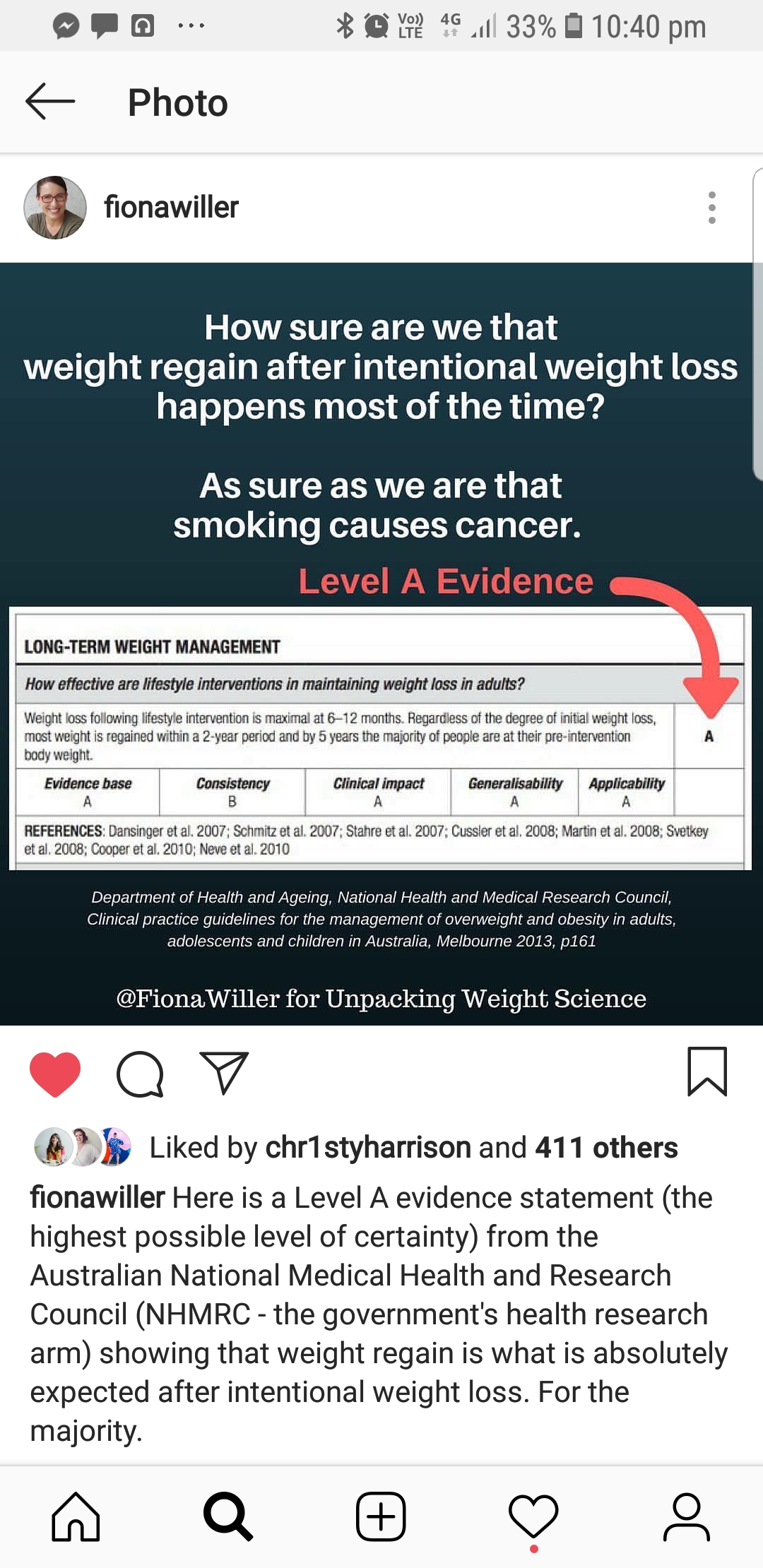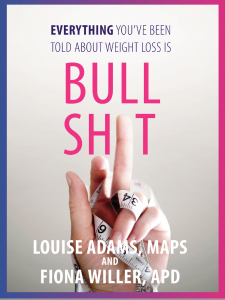Strap yourself in for a wild ride on the rollercoaster of yo-yo dieting! My guest is utterly fierce HAES psychologist and eating disorder specialist Deb Burgard @BodyPositivePhD who is DISEMBOWELLING a new study which claims that yo yo dieting is actually really good for you. You will not believe how shaky this science is, or the lengths that Deb went to in order to sniff out the truth! Join us for a fabulous rant about the evils of the weight cycling industry, mouse research, dodgy science, cake icing, white supremacy, and more!
Show Notes
- The fabulous Deb Burgard is fired up about the weight scientists desperately trying to legitimise the failure of dieting by using mouse research to justify weight cycling.
- The vast majority of people who diet put the weight back on. The evidence to support this is extremely robust – Level “A” evidence according to the National Health & Medical Research Council. We are as sure that people will put weight back on as we are that smoking causes lung cancer. The evidence just doesn’t get any stronger in research!
- But the weight loss industry has profited from selling the hope of long term, permanent weight loss, and it has even convinced us that when we fail, it’s us that’s the failure, not the product itself!
- It’s probably one of the largest gaslighting industries in the world.
- It’s hard wired in us to regain weight, it’s a normal process of our bodies returning to homeostasis. We are supposed to have size diversity.
- Weight suppression is a pathology, not an achievement. But we only recognise it as a pathology in thin people, and we completely miss it in larger people.
- Higher weight people with exactly the same illness (AN) won’t get the diagnosis as easily (or at all!) as a thin person with AN. We prescribe for fat people what we diagnose as eating disordered in thin people.
- Deb is renowned for standing up and calling things as she sees them. She’s not afraid to call out the weight cycling industry and challenge the paradigm!
- Deb has seen people for 30 years, she’s seen how people suffer at the hands of diet culture. Larger people with lives worth living, the casualties of this idea that they’re supposed to spend their life pursuing thinness. For Deb, pursuing diet and weight loss is a giant waste of time which we can’t get back. No-one should have to lose years of their lives dedicated to this project of weight loss, which science shows us won’t work.
- Deb wants everyone to divest from the weight cycling industry, because it’s a death industry. We need all hands on deck to dismantle weight-centric business models. It’s a white supremacy model, based on oppression.
- Deb has been around for a long time, she grew up absorbing the atmosphere of the women’s movement and the civil rights movement, and for a long time she has fought for social change. Getting together and fighting battles really does and can change the world.
- When we wake up and realise that it’s not us, but the world that is wrong, and we come together as a community, we become strong.
- Looking at diet culture nowadays is kind of like the story of the Emperor’s New Clothes, where you’re standing there looking around for the other people who can see that he’s naked! We need each other. We need to know that other people think like this!
- Deb has a big community of people, both locally and online, and this community has helped her to find and use her voice, and to gallop the HAES movement forward.
- This is how we got started on today’s topic: in a chat room, a new study came out on mice which showed that mice who weight cycled – ie the mice who went off and on diets – lived longer than mice who stayed fat. The paper concluded that people should still try to diet, even if they will put it back on, because presumably the same effect would generalise to humans.
- It’s a really irritating way to interpret the failure of dieting – that even though diets don’t work, we should just put up with weight cycling and yo yo diet all of our lives, because the less time spent being fat, the better.
- Weight science history – at first, it started out aiming to make fat people not fat anymore. But when that didn’t work, the aim became 20% weight loss, that didn’t work, so they went to 10%, and that still didn’t happen, so now they’ve dropped the definition of weight loss ‘success’ to 5% and even less – not because science shows benefits there, but because humans just don’t lose that much weight in weight loss studies.*
- People like Paul Ernsberger have been turned away from studying weight cycling and actively discouraged.
- The Look Ahead study is often talked about as an example of ‘proof’ that people can lose weight & keep it off, even though that study was stopped early because it turned out that making people lose weight didn’t actually reduce their risk of having a heart attack. Deb talks about how people in this study were older, and even the control group were losing weight. Also, the people in the intensive lifestyle intervention group were subjected to intense pressure, and knew they would be weighed every year, so everyone made a big effort in the 6 months leading up to the weigh in. So this is actually a study of weight cycling, not a triumph of effortless lasting weight loss.
- Behind the scenes, people in these studies talk about how much bullshit goes on. When people are not weighed and just provide answers, they know what the researchers want to hear, and there’s shame about weight regain too. Deb loves to really dig into the research studies, to go beyond the headlines and abstracts and really ask the question – what did they do here?
- In the mouse study, it is a particular strain of mice that were studied. Deb went & spoke to people who know more about mice research than she does, including the authors.
- The study concluded that weight cycling in mice was a good thing.
- There’s a few issues here. Paul Ernsberger speaks about the unique properties of species like mice. They are basically a food supply for predators. When there is a lot to eat, they don’t need to turn on their genes to make them live longer, because they’ll be able to quickly procreate and make lots of offspring. When there’s not a lot of food around, these genes in the mice switch on, allowing them to live longer and procreate later, ensuring that they will continue to exist as a species. As an apex predator, humans do not follow this pattern and do not display this type of change. So right there, there’s reason to doubt that whatever we see in mice when they are deprived of food will be similar in humans. So mice research in this area really doesn’t generalise well to understanding humans.
- The other interesting point here is how these mice were fed in order to produce ‘obesity’. The study says they were fed a high fat diet. Paul Ernsberger says that it is probably more accurate to say that the mice were fed the equivalent of cake icing! For breakfast, lunch and dinner. Even the most extreme human diets don’t mirror this type of diet.
- So interestingly, even when mainlining cake icing, ⅓ of the mice didn’t get fat, so they were eliminated from the study.
- As Deb points out, in humans, many of those at higher weights are not like that because they’re all eating fast food. They’re just larger people. So the mice who started small and became big through force feeding are really different to the human population who basically have multiple reasons that they may be larger.
- So of the ⅔ of the mice that were left, a huge number of them got a condition called ulcerative dermatitis and either died or had to be euthanised. This was more than 200 animals out of 500. But the authors are using their lifespans to argue for weight cycling?
- It is possible that the mice who were being fed only the cake frosting diet were getting sick and dying, so now we have a completely confounding factor here. How did this paper get through? Deb has asked the author but really didn’t get an answer, apparently another paper is coming out.
- Basically, the weight cycling mice were given a break from the relentless cake icing feeding, and it may very well be that break from a horrible diet which was related to their longer lifespan, not weight cycling.
- So Deb went to the company that bred the mice, and asked how long their lifespan was. The average lifespan of this strain of mice was apparently well below what all of the mice in the experiment lived for! So all of the mice in this experiment – including the ones who were always fat – lived longer than the average lifespan for this strain. This fact was not mentioned in the paper. New headline – “cake frosting prolongs life if it doesn’t kill you?!”
- A well fed population, a population with good nutrition, means we change – our puberty happens earlier, it also means we are heavier. And yes, this change brings different health challenges.
- There’s definitely a health disparity between higher weight people and lower weight people. This may be about fat cells driving things. But also, If you’re treated poorly it’s going to have an effect on your health. And we have very good evidence that larger people are not treated well. So it is plausible that there is an interaction between all of these factors – structural oppression, weight stigma, health care inequities – with our biology – and to ignore all of these factors and focus only on the narrow physiology is another case of the Emperor’s new clothes.
- Some people would argue that all of the rat and mice studies are impacted, because they are social animals but in experimental conditions they all live separately.
- Researchers really want to be doing research follow ups for longer than they are right now, but grant money and structures don’t support such models.
- We absolutely need more research to understand the whole phenomenon of weight cycling in humans, given that most of us will weight cycle. But it’s not an area which is heavily researched. Many weight loss studies don’t last long enough to cover a whole weight loss/regain cycle – they stop the research at the end of the weight loss period, and don’t look further.
- There is a real issue in research in weight science of not following people for a minimum of 5 years, which really should be the standard. Short term weight loss research really is a waste of time and money. We should do less research, but do it for longer time periods, to gather meaningful information.
- The harms of interventions are also not being captured in current research models, even though Stunkard was saying it back in 1959!
- Speaking of harms not being captured, researchers in the eating disorder field are planning to present at the ICED conference in 2019 saying that dieting in adolescents doesn’t lead to eating disorders! This will no doubt be based on research with flaws like we’ve mentioned.
- It’s really sad how the diagnostic criteria for binge eating disorder completely misses the restriction part. Those of us who work with people with binge eating issues know how restriction shows up – in a feeling of guilt after a binge, in experiencing thoughts about restricting food, and in restrictive behaviours – but it’s just been disregarded by the powerful people who were in charge of creating the diagnosis whose weight bias stops their ability to imagine that fat people could also be restricting!
- Our eating disorder criteria is tragically bound to weight biased understanding of eating disorders.
- It’s sad that the people in power had so little understanding of the phenomenon they were describing. It’s back to white supremacy again.
- The drive to make some bodies have more worth than other bodies is evil.
- If we don’t understand this history, we will repeat the mistakes.
- Food insecurity also impacts on all of this.
- People who publish research on binge eating disorder who trumpet about how their intervention not only led to a reduction in eating disorder symptoms but also to weight loss, are missing the point. They are embroiled with the eating disorder and not seeing the bigger picture. You’re just at the bottom of the diet cycle. But many researchers are so weight biased that they don’t understand that people with this disorder can not binge for months. They are capable of restriction. Restriction is part of the problem!
- If you’re too good at restriction you’re going to run into trouble one way or another.
- what we think of as success is actually part of the problem, if you just look at the psychology of this.
- Back in the days when homosexuality was considered an ‘illness’, Evelyn Hooker presented psych test batteries to psychiatrists and asked people to pick out who was gay from examining the tests. She showed them there was no difference between psych results based on sexuality. Here’s another way of thinking – if we presented eating disorder experts with a list of behaviours of something a client was doing, and asked them to determine if the person had an eating disorder. If people agree that it is an eating disorder if a person is thin, but not if a person is fat, this is a problem. It’s not ‘tips’ from the weight control registry, it’s a disorder!
- Science is supposed to be about stepping back from our presuppositions. We need more people who think critically, ask questions, and push back. We need to recognise our bias. It is part of science to come up with alternative hypotheses. It can be difficult to get access to the training in order to critique studies, but thinking critically is a time-honored tradition of all people resisting oppression.
Resources Mentioned:
The NH&MRC slide from the fabulous Fiona Willer:

*A really good study which talks about the history of % weight loss targets
The mouse study on weight cycling
The Look Ahead study


